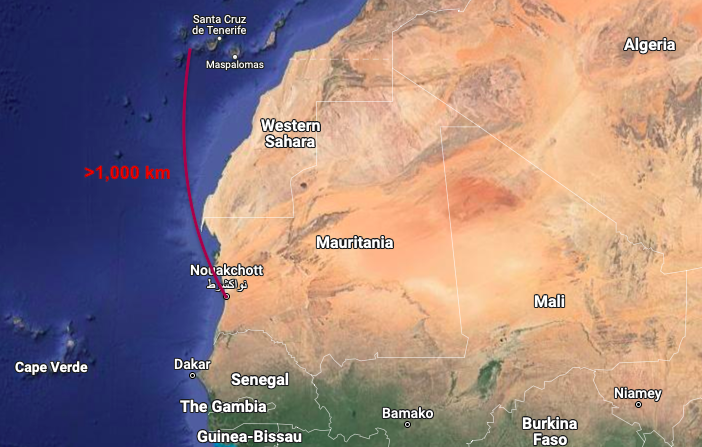Nineteen bodies were found drifting in a boat off the coast of St. Kitts and Nevis, a Caribbean country. Authorities believe the boat had drifted from the African coast with migrants on board. This marks the first such discovery in recent memory in the twin-island nation.
At least 19 bodies have been found drifting at sea off the coast of the Caribbean nation of St. Kitts and Nevis, local authorities announced on Thursday (January 30).
"We are not certain, but we believe that this vessel originated off the West African coast," Police Commissioner James Sutton told the news agency the Associated Press (AP). "It was a fishing vessel, which is not typically found in the Caribbean," he noted.
Police and medical officials have launched an investigation into the circumstances surrounding the deaths.
Identifying the bodies
The St. Kitts and Nevis Coast Guard responded to reports of a drifting vessel off the coast of Nevis on Wednesday around 11:30 am. The partially submerged boat was found to contain decomposed human remains and was then towed to St. Kitts for investigation.
Officer Sutton said that authorities now face the challenging task of identifying the bodies and determining their exact number, as the advanced state of decomposition has complicated the process.
Read AlsoRecord toll for migrants missing at sea: Spanish NGO
Mauritania – an upcoming departure point
On Saturday, a similar alert led to the discovery of a vessel with five dead people onboard off Trinidad and Tobago, around 1,200 kilometers (750 miles) away, the Guardian newspaper reported.
The vessel, which was in a poor state and sank while being towed to the island, showed a "striking resemblance" between the vessel found on Saturday and another discovered nearby in 2021 which contained the remains of 15 people, the Guardian reported, citing the Trinidadian coast guard.

In May 2021, fishermen found the decomposing bodies of more than a dozen men inside a vessel off the island of Tobago. 135 days prior to the discovery, 43 people were believed to have left a port city across the ocean from the African continent, and tried to reach Spain's Canary Islands, but never arrived. Instead, they turned up in Tobago, according to the AP investigation, which reported that the vessel was registered in the northwestern African country of Mauritania, nearly 4,800 kilometers (3,000 miles) away.
"Evidence found on the boat -- and its style and color as a typical Mauritanian "pirogue" -- suggested the dead were likely African migrants who were trying to reach Europe but got lost in the Atlantic," the AP report found.
Read AlsoMauritania – a new irregular migration gateway to Europe?
Africa's 'ghost boats'
In 2021, at least seven boats, believed to have originated from northwest Africa, washed ashore in the Caribbean and Brazil -- each carrying deceased passengers.
Stricter migration controls in the Mediterranean Sea, combined with factors like the economic fallout from the COVID-19 pandemic, have driven migrants to seek alternative routes. Many have turned to the far longer, less monitored, and significantly more dangerous Atlantic passage from northwest Africa to Europe via the Canary Islands instead, with some unlucky vessels ending up as far as the Caribbean and South America and becoming so-called "ghost boats."
Read AlsoDominican Republic: Authorities work to identify bodies found in migrant boat
Canary Islands see sharp rise in arrivals from African continent
In recent years, the Canary Islands off the African coast have emerged as the primary destination for undocumented migrants from the African continent entering Spain in search of a better life, despite the Atlantic being one of the deadliest irregular migration routes.
The Atlantic route is fraught with strong winds and currents. Boats veering off course can drift for months, ending up in distant locations where migrants can perish from dehydration and malnutrition.
Frontex reported an 18 percent increase in migrant arrivals to the Canary Islands. According to the EU border management agency, nearly 47,000 migrants arrived in the Canaries, the highest number recorded since the agency began tracking data in 2009.
The islands have seen a sharp rise in arrivals from Mali, with nearly 10,000 Malians reaching the archipelago between January and August -- compared to just 784 during the same period last year. Senegalese migrants made up the second-largest group, followed by Moroccans. Most embark on their journey from Mauritania, Senegal, and Gambia, sailing westward across the Atlantic to reach the Canaries.
With AP and Reuters
Read AlsoCorpse-laden boat found in Caribbean 'drifted from Africa'
